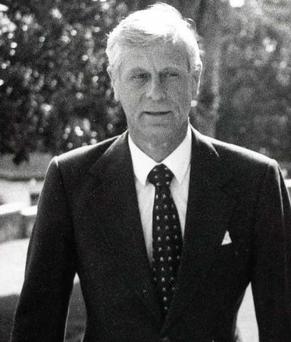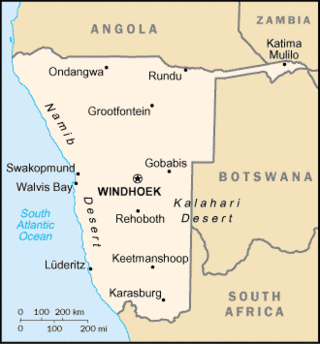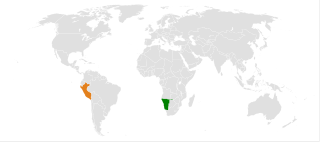| |||||
| Decades: | |||||
|---|---|---|---|---|---|
| See also: | |||||
The following events occurred during 1990 in Namibia .
| |||||
| Decades: | |||||
|---|---|---|---|---|---|
| See also: | |||||
The following events occurred during 1990 in Namibia .

Politics of Namibia takes place in a framework of a semi-presidential representative democratic republic, whereby the President of Namibia is both head of state and head of government, and of a pluriform multi-party system. Executive power is exercised by both the president and the government. Legislative power is vested in the two chambers of Parliament. The judiciary is independent of the executive and the legislature.
The history of Namibia has passed through several distinct stages from being colonised in the late nineteenth century to Namibia's independence on 21 March 1990.

Samuel Shafiishuna Daniel Nujoma, is a Namibian revolutionary, anti-apartheid activist and politician who served three terms as the first President of Namibia, from 1990 to 2005. Nujoma was a founding member and the first president of the South West Africa People's Organization (SWAPO) in 1960. Before 1960, SWAPO was known as the Ovambo People's Organisation (OPO). He played an important role as leader of the national liberation movement in campaigning for Namibia's political independence from South African rule. He established the People's Liberation Army of Namibia (PLAN) in 1962 and launched a guerrilla war against the apartheid government of South Africa in August 1966 at Omugulugwombashe, beginning after the United Nations withdrew the mandate for South Africa to govern the territory. Nujoma led SWAPO during the lengthy Namibian War of Independence, which lasted from 1966 to 1989.

Hifikepunye Lucas Pohamba is a Namibian politician who served as the second president of Namibia from 21 March 2005 to 21 March 2015. He won the 2004 presidential election overwhelmingly as the candidate of SWAPO and was reelected in 2009. Pohamba was the president of SWAPO from 2007 until his retirement in 2015. He is a recipient of the Ibrahim Prize.

Albert Mishake Muyongo is a Namibian politician and former Member of Parliament who is currently living in exile in Denmark.
The Ovamboland People's Organization (OPO) was a nationalist organization that existed between 1959 and 1960 in South West Africa. The aim of the organization was to end the South African colonial administration, and the placement of South West Africa under the United Nations Trusteeship system. Andimba Toivo ya Toivo had founded its predecessor, the Ovamboland People's Congress, in 1957 in Cape Town, South Africa. In 1959, Sam Nujoma and Jacob Kuhangua established the Ovamboland People's Organization (OPO) at the Old Location in Windhoek. Sam Nujoma was the president of OPO until its transformation into the South West Africa People's Organization (SWAPO) a year later and remained president until Namibia gained independence in 1990.

Louis Alexander Pienaar was a South African lawyer and diplomat. He was the last white Administrator of South-West Africa, from 1985 through Namibian independence in 1990. Pienaar later served as a minister in F W de Klerk's government until 1993. He married Isabel Maud van Niekerk on 11 December 1954.

United Nations Commissioner for South West Africa was a post created by the United Nations General Assembly (UNGA) in 1966 to assert the UN's direct responsibility for South West Africa which was then under illegal occupation by apartheid South Africa.

Nangolo Mbumba is a Namibian politician who is the fourth and current president of Namibia. He became president after the death of Hage Geingob, under whom he had served as the second Vice-president of Namibia from 2018 to 2024.

Parliamentary elections were held in Namibia between 7 and 11 November 1989. These elections were for the Constituent Assembly of Namibia, which, upon independence in March 1990, became the National Assembly of Namibia.

Namibia: The Struggle for Liberation is a 2007 epic film on the Namibian independence struggle against South African occupation as seen through the life of Sam Nujoma, the leader of the South West Africa People's Organisation and the first president of the Republic of Namibia. The film was written and directed by Charles Burnett and stars Carl Lumbly and Danny Glover. The government of Namibia financed the production. Music composed by Stephen James Taylor won the award for Best African Film at the Kuala Lumpur International Film Festival. The film also won for Best Music Score and Best Director.
The 1978 Settlement Proposal in Namibia, devised by the Contact Group of Western States, mandated the United Nations Transition Assistance Group (UNTAG) under United Nations Security Council Resolution 435 to assist a UN Special Representative appointed by the UN Secretary-General 'to ensure the early independence of Namibia through free and fair elections under the supervision and control of the United Nations'.
The following lists events that happened during 2005 in Namibia.
Mburumba Kerina was a Namibian politician and academic. He was a co-founder of SWAPO, NUDO, and FCN, and the founder of a host of smaller political parties. For independent Namibia, he was a member of Namibia's Constituent Assembly, as well as the National Assembly and the National Council. Kerina coined the name "Namib" for the independent state "Namibia" on the territory of South West Africa.

Namibia–North Korea relations refers to the current and historical relationship between Namibia and the Democratic People's Republic of Korea (DPRK). Neither country maintains an embassy in their respective capitals, although DPRK formerly had one in Windhoek, which closed down in 1994.
Kovambo Theopoldine Katjimune Nujoma is a Namibian political figure and former First Lady of Namibia.

The Independence Memorial Museum is a history museum in Windhoek, the capital of Namibia. It focuses on the anti-colonial resistance and the national liberation movement of Namibia.

Brazil and Namibia established diplomatic relations in 1990. Both nations are members of the Group of 77 and the United Nations.
Gerhardus Jacobus 'Gert' Hanekom, affectionately known as Oom Gert, was a Namibian politician serving in several ministerial portfolios.

Namibia–Peru relations refers to the current and historical relations between Namibia and Peru. Both countries are members of the Non-Aligned Movement.